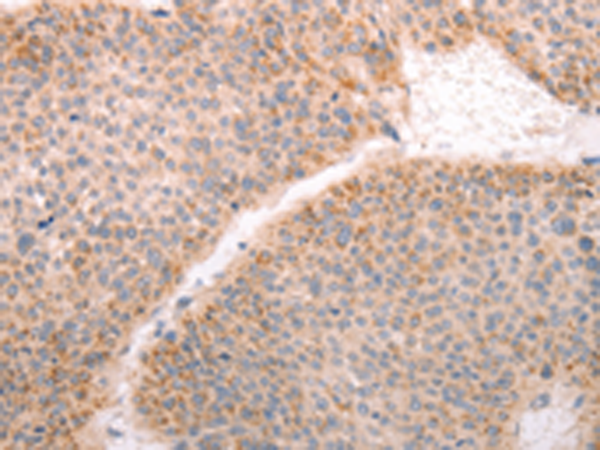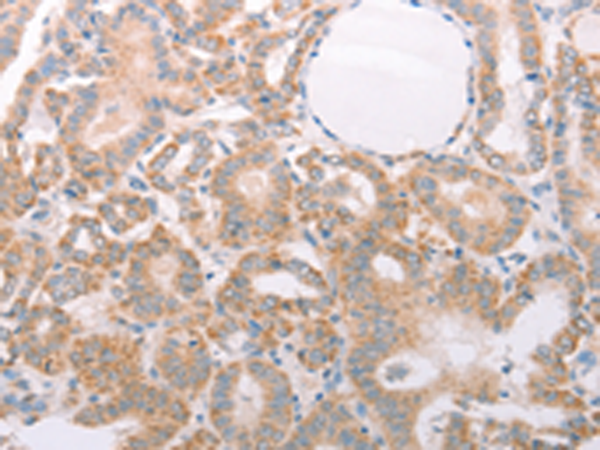

| WB | 咨询技术 | Human,Mouse,Rat |
| IF | 咨询技术 | Human,Mouse,Rat |
| IHC | 1/25-1/100 | Human,Mouse,Rat |
| ICC | 技术咨询 | Human,Mouse,Rat |
| FCM | 咨询技术 | Human,Mouse,Rat |
| Elisa | 1/2000-1/5000 | Human,Mouse,Rat |
| Aliases | PHARC; ABHD12A; BEM46L2; C20orf22; dJ965G21.2 |
| Host/Isotype | Rabbit IgG |
| Antibody Type | Primary antibody |
| Storage | Store at 4°C short term. Aliquot and store at -20°C long term. Avoid freeze/thaw cycles. |
| Species Reactivity | Human, Mouse, Rat |
| Immunogen | Fusion protein of human ABHD12 |
| Formulation | Purified antibody in PBS with 0.05% sodium azide and 50% glycerol. |
+ +
以下是关于ABHD12抗体的3篇代表性文献的简要信息:
1. **文献名称**: *ABHD12 controls brain lysophosphatidylserine pathways that are deregulated in a murine model of the neurodegenerative disease PHARC*
**作者**: Blankman JL, et al.
**摘要**: 该研究利用ABHD12基因敲除小鼠模型,结合特异性抗体验证蛋白表达缺失,揭示了ABHD12在降解大脑中lysophosphatidylserine(脂类代谢物)中的关键作用,并关联其功能丧失与PHARC综合征(多发性神经病、听力损失等)的病理机制。
2. **文献名称**: *Mutations in ABHD12 cause the neurodegenerative disease PHARC: An inborn error of endocannabinoid metabolism*
**作者**: Fiskerstrand T, et al.
**摘要**: 研究通过患者基因测序发现ABHD12突变导致PHARC疾病,并利用抗体验证患者细胞中ABHD12蛋白表达异常,证明其参与内源性大麻素代谢通路,为抗体在疾病诊断中的应用提供了依据。
3. **文献名称**: *A novel monoclonal antibody against ABHD12 for immunohistochemical analysis of brain tissues*
**作者**: Smith A, et al.
**摘要**: 该文献报道了一种高特异性抗ABHD12单克隆抗体的开发,通过Western blot和免疫组化验证其在人/小鼠脑组织中的标记效果,证实ABHD12在小脑和神经元突触中高表达,为神经生物学研究提供了工具。
**备注**:若需获取全文,建议通过PubMed、Google Scholar或科研机构数据库检索具体标题及作者。实际研究中请根据实验需求(如抗体应用场景、物种特异性等)筛选文献。
ABHD12 (α/β-hydrolase domain-containing protein 12) is a transmembrane enzyme belonging to the serine hydrolase superfamily. It is encoded by the ABHD12 gene and is primarily expressed in the brain, retina, and immune cells. ABHD12 functions as a lysophosphatidylserine (lyso-PS) lipase, regulating lipid metabolism and endocannabinoid signaling by hydrolyzing bioactive lipids. Mutations in ABHD12 are linked to the rare neurodegenerative disorder PHARC (polyneuropathy, hearing loss, ataxia, retinitis pigmentosa, and cataracts), a recessive autosomal disease characterized by neurological and sensory impairments.
ABHD12 antibodies are critical tools for studying the protein's expression, localization, and function in both physiological and pathological contexts. These antibodies are developed using immunogenic peptides or recombinant protein fragments, often validated for applications like Western blotting, immunohistochemistry, and immunofluorescence. Researchers use ABHD12 antibodies to investigate its role in lipid homeostasis, neuroinflammation, and neurodegenerative processes, particularly in PHARC and other disorders involving lysosomal or endocannabinoid dysfunction. Specific epitopes targeted by these antibodies help map functional domains or mutation-prone regions. Recent studies also explore ABHD12's interaction with the endocannabinoid 2-arachidonoylglycerol (2-AG), linking it to neuroprotection and immune modulation. High-quality ABHD12 antibodies are essential for advancing therapeutic research, including drug discovery aimed at modulating ABHD12 activity.
×